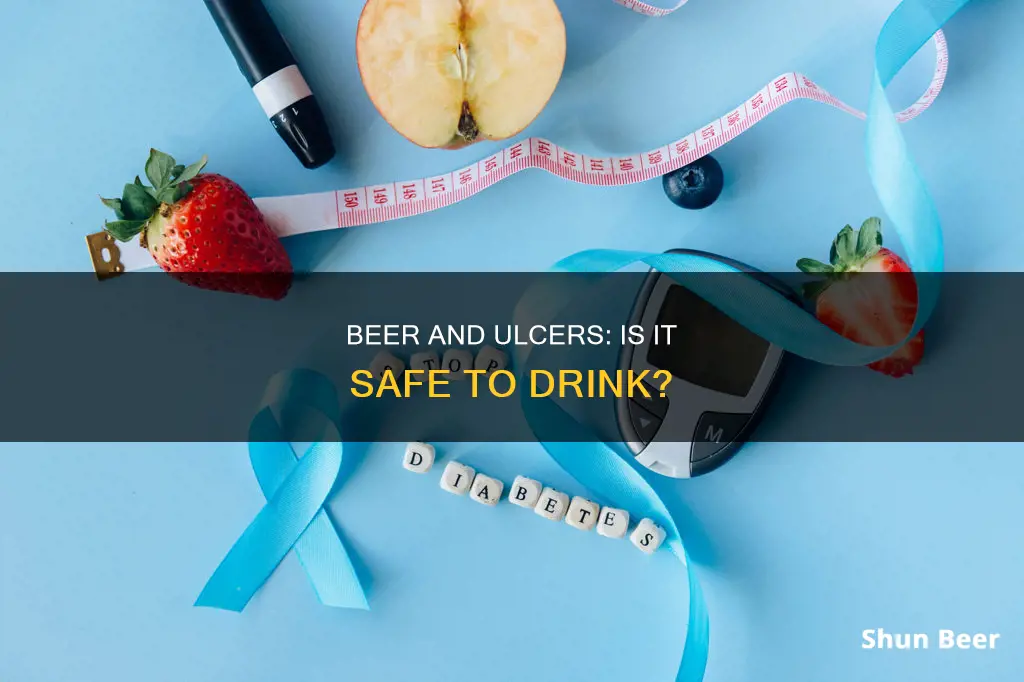
Drinking alcohol is not recommended for people with stomach ulcers, as it can worsen symptoms such as abdominal pain, nausea, and vomiting. Alcohol can also delay the healing process and possibly worsen the condition. While alcohol is not a direct cause of ulcers, it is a risk factor and can increase the likelihood of developing one. This is because alcohol can damage the stomach lining, which may eventually lead to erosion and the development of ulcers. If you are drinking alcohol while suffering from an ulcer, it is important to speak to your doctor about the healthiest drinking habits to maintain until your ulcer heals.
| Characteristics | Values |
|---|---|
| Can alcohol directly cause ulcers? | There is little evidence to suggest that alcohol directly causes stomach ulcers. |
| Can alcohol increase the risk of developing ulcers? | Yes, alcohol is considered a risk factor for developing stomach ulcers. |
| Can alcohol worsen ulcer symptoms? | Yes, alcohol can worsen ulcer symptoms and prevent them from healing. |
| Can alcohol cause bleeding ulcers? | Yes, excessive alcohol consumption might increase the risk of bleeding ulcers. |
| Can alcohol irritate the gastric mucosa? | Yes, alcohol can irritate the gastric mucosa and increase the level of acidity. |
| Is alcohol a cause of mouth ulcers? | Alcohol isn't considered a direct cause of mouth ulcers, but it may contribute to or trigger them due to its acidic nature. |
| Is it safe to drink alcohol with an ulcer? | It is generally recommended to avoid alcohol if you have an ulcer, as it can worsen symptoms and delay healing. |
| What is considered moderate alcohol consumption? | For people assigned female at birth, drinking up to one drink per day is considered moderate. For people assigned male at birth, drinking up to two drinks per day is considered moderate. |
What You'll Learn

Alcohol doesn't directly cause stomach ulcers but it is a risk factor
Alcohol doesn't directly cause stomach ulcers, but it is a risk factor. Research shows that alcohol can weaken the gastric mucosal barrier, which is the top layer of the stomach lining that keeps gastric acid contained. If this barrier is broken, acid can leak into the surrounding stomach lining or the lining of the upper portion of the small intestine, causing it to break or tear. The resulting open sores are called peptic ulcers.
Alcohol consumption can also worsen the symptoms of current stomach ulcers, such as pain, bloating, and vomiting. It can also increase the healing time of ulcers and make them more likely to recur. Heavy drinking is defined as more than four drinks a day or more than 14 drinks per week for men, and more than three drinks a day or more than seven drinks per week for women.
Drinking alcohol when you have an ulcer can make the sore larger because more of the gastric mucosal barrier will be damaged. It is recommended that you abstain from alcohol completely while an ulcer is healing. Even after an ulcer has healed, returning to drinking increases your risk of developing another ulcer, especially if you pair alcohol consumption with another lifestyle behaviour that can harm gastrointestinal health, such as smoking.
Beer and Metronidazole: Is It Safe to Mix?
You may want to see also

Heavy drinking can worsen ulcer symptoms
Heavy drinking can have a significantly negative effect on existing ulcers, delaying healing and worsening the condition. It can also increase the risk of developing an ulcer.
Heavy drinking is defined as men consuming more than four drinks in a day or 14 drinks a week, and women consuming more than three drinks in a day or seven drinks a week. Binge drinking at least five times in a month also falls under this category.
Heavy drinking can cause gastric erosion, which may contribute to the development of stomach ulcers. Alcohol can weaken the gastric mucosal barrier, which is the top layer of the stomach lining that keeps gastric acid contained. If this barrier is broken, acid can leak into the surrounding stomach lining or the upper portion of the small intestine, causing it to break or tear. The resulting open sores are called peptic ulcers.
Alcohol can also irritate the gastric mucosa, a layer of mucous membrane in the stomach, and increase the level of acidity. Continuous alcohol consumption may elongate ulcer healing time.
If you have an ulcer, it is recommended that you abstain from alcohol completely while the ulcer is healing. Quitting alcohol for a few months while an ulcer is healing can be advantageous for other alcohol-related issues. Even after an ulcer has healed, returning to drinking increases the risk of developing another ulcer.
Exploring Alcohol Culture: Beer Drinking in Israel
You may want to see also

Alcohol can prevent stomach ulcers from healing
Alcohol can also increase the risk of bleeding ulcers, which can be very dangerous. A 2000 study of 26,518 Danish participants found that drinking more than 42 drinks per week increased the risk of a bleeding ulcer fourfold.
If you have a stomach ulcer, it is advisable to reduce your alcohol consumption or, better yet, stop drinking altogether until the ulcer has healed. Alcohol can make ulcers last longer and can irritate the ulcer, making it harder to heal.
Even light drinking can irritate ulcers. Beer and other drinks with less than five per cent alcohol can increase stomach acid production, and the extra acid can irritate the ulcer.
If you are struggling to cut down on alcohol, consider reaching out for professional help from a primary care physician, therapist, or support group.
Beer Distributors: The Logistics of Getting Beer to Customers
You may want to see also

Alcohol can irritate the gastric mucosa, increasing acidity
Alcohol can also overwhelm the gastrointestinal tract and liver, leading to an inflammatory response that exacerbates organ damage. This inflammation can contribute to a "vicious cycle" of difficulties throughout the gastrointestinal tract, including decreased absorption of nutrients, a higher risk of acid reflux and gastritis, and an increased risk of certain cancers, such as oesophageal cancer and colorectal cancer.
In addition, heavy drinking can weaken the function of the oesophageal sphincter, which may lead to acid reflux and heartburn. Alcohol can also impede the muscles around the stomach and small intestines, interfering with gastric and intestinal motility.
Drinking excessive amounts of alcohol may be a cause of acute erosive gastropathy, where the stomach lining develops ulcers, erosions, and bleeding. Inflammation of the stomach lining is also sometimes seen in people who chronically drink in excess, and this alcohol-involved gastritis is strongly associated with active infection of the bacteria Helicobacter pylori (H. pylori). A common cause of peptic ulcer disease, it can increase the risk of stomach cancer if left untreated.
Therefore, it is advisable to avoid alcohol if you have an ulcer.
Exploring the Limits: 50 IPAs, a Safe Challenge?
You may want to see also

Alcohol can cause gastritis, an inflammation of the stomach lining
Alcoholic gastritis is a condition that can develop as a result of misusing alcohol. It is characterised by inflammation of the stomach lining, which can be acute or chronic. Acute gastritis is an immediate inflammation that is typically more painful and may cause severe stomach cramping, irritability, and vomiting. Chronic gastritis, on the other hand, is a long-term condition where the stomach lining remains inflamed and worn down over time. Regular alcohol consumption can lead to this gradual erosion of the stomach lining, triggering gastritis symptoms.
The symptoms of alcoholic gastritis include abdominal pain, nausea, vomiting, a bloated or full feeling in the abdomen, and regurgitation of food. These symptoms may occur after a night of binge drinking or develop into a more chronic issue for those who drink heavily over an extended period.
Alcoholic gastritis can lead to serious complications, such as gastrointestinal tract bleeding, which is a medical emergency. Other potential complications include obstruction or perforation of the stomach, which are also emergency situations that can be life-threatening.
The most effective way to treat alcoholic gastritis and prevent these complications is to limit or stop alcohol consumption. This is because, without removing the main cause, the gastritis is likely to persist even with medical intervention. Additionally, heavy drinking is considered a risk factor for developing stomach ulcers, and alcohol can irritate existing ulcers and prevent them from healing. Therefore, it is advisable to avoid alcohol if you have an ulcer.
Breastfeeding and Beer: Is It Safe to Drink Alcohol?
You may want to see also
Frequently asked questions
It is not recommended to drink beer or any other alcoholic beverage if you have an ulcer. Alcohol can irritate the gastric mucosa, a layer of mucous membrane in the stomach, and increase the level of acidity. This can worsen the symptoms of an ulcer, such as abdominal pain, nausea, and vomiting. Alcohol can also delay the healing process of an ulcer.
Drinking alcohol with an ulcer can increase the risk of complications such as bleeding, perforation of the affected area, obstruction of the digestive tract, and peritonitis. These complications can be severe and life-threatening. Additionally, alcohol can prevent ulcers from healing and worsen the symptoms.
Yes, there are several drinks that may help soothe stomach ulcers, including cabbage juice, honey water, and turmeric tea. These drinks have anti-inflammatory or antioxidant properties that can protect the stomach lining.







